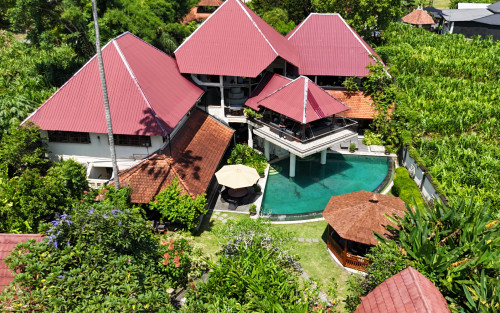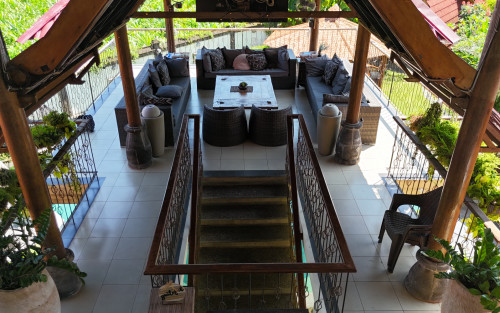








Kembali Recovery Center
Verified Center
This provider's information has been quality-checked by Recovery.com's Research Team for accuracy and completeness, including center verification through appropriate third-party organizations.
Treatment Focus
This center treats substance use disorders and mental health conditions. You'll receive individualized care catered to your unique situation and diagnosis, learn practical skills for recovery, and make new connections in a restorative environment.
Primary Level of Care
Offering intensive care with 24/7 monitoring, residential treatment is typically 30 days and can cover multiple levels of care. Length can range from 14 to 90 days typically.
Treatment Focus
This center treats substance use disorders and mental health conditions. You'll receive individualized care catered to your unique situation and diagnosis, learn practical skills for recovery, and make new connections in a restorative environment.
Primary Level of Care
Offering intensive care with 24/7 monitoring, residential treatment is typically 30 days and can cover multiple levels of care. Length can range from 14 to 90 days typically.
Private Pay
You pay directly for treatment out of pocket. This approach can offer enhanced privacy and flexibility, without involving insurance. Exact costs vary based on program and length of stay. Contact the center for specific details.
Kembali Recovery Center
Kembali Recovery Center
About Kembali Recovery Center
Kembali Recovery Center offers a world-class inpatient recovery experience in the heart of Bali, Indonesia. Rolling intake is available each Monday. They welcome a maximum of 8 clients at a time for small, focused groups that can grow into a supportive community. Their holistic program incorporates the Bio-psycho-social-spiritual method. This form of treatment focuses on balancing four important areas of life, including mind, body, emotions, social interactions, and spirit. Kembali Recovery Center focuses largely on self-awareness, understanding beliefs about oneself, how they drive unhealthy behaviors and then how to do things differently. They’re located in a tropical, serene environment, with foliage and rice fields stretching out around their luxury villas.
Fully-Informed Continuum Of Care
Kembali Recovery Center was founded by a mother-and-son duo, with the goal of providing an approach to treatment that differed from the rest. One of the ways they accomplish this is by having small treatment groups. This ensures a true sense of community and fellowship at Kembali, between peers and treatment providers. Kembali’s certified counselors provide group counseling and 1:1 counseling 3 times a week. They have an onsite psychologist and work closely with a psychiatrist. Kembali believes their small groups create the perfect environment for building connections, trust, and a full set of skills to take home after treatment. Aftercare is just as important, and they provide clients with all the necessary information to join a support group near them. Clients will also maintain phone contact with Kembali’s staff, and learn more about relapse prevention.
Special Treatment Approaches And Compassionate Staff
Kembali’s staff have worked through addiction and recovery themselves, which allows them to operate in all areas of treatment with compassion and empathy. This flows from the top down, as Kembali’s founders provide an example of sober success and healing–for their staff and clients. Kembali Recovery Center builds upon the philosophy of Johan Hari, which states “The opposite of addiction is connection.” Kembali teaches, or reteaches, clients how to make those connections with both themselves and others, enabling a full restoration of self. Since they hold personal and interpersonal connections at such high importance, clients’ first week of treatment has an intensive 2-day connections workshop. This workshop helps identify and break down any barriers that may hamper Kembali’s treatment process, and also allows for immediate and deep group bonding.
Matchless Amenities And Activities
At Kembali, clients will enjoy a truly unmatched array of activities and amenities. Activities include whitewater rafting, a visit to The Pyramids of Chi, sound healing, bike rides through scenic rice fields, stunning valley views, scuba diving, temple visits, making monkey friends, and seeing Bali’s culture firsthand. The chefs at Kembali provide a wide range of meals, keeping any dietary restrictions or preferences in mind as they prepare each meal. Kembali additionally allows phone use from Friday evening to Sunday evening, and daily use based on client needs.
Connections Workshop

Highlights from the Center
Highlights
These highlights are provided by and paid for by the center.
Wellness Emphasis
Family Owned & Operated
Unique Cultural Experiences
Budget Friendly
Center Overview
Treatment Focus
This center treats substance use disorders and mental health conditions. You'll receive individualized care catered to your unique situation and diagnosis, learn practical skills for recovery, and make new connections in a restorative environment.

Kembali Recovery Center
Pricing and Program Length
Estimated Center Costs
The cost listed here ($11,000 - $13,000 USD), is an estimate of program cost. Center price can vary based on program and length of stay. Contact the center for more information. Recovery.com strives for price transparency so you can make an informed decision.




Recovery.com Verified Listing
Recovery.com verified that the name, location, contact information and license to operate for this treatment provider are valid and up-to-date.

Licensed
Recovery.com is an independent, third-party mental health resource. Verification does not imply endorsement and does not guarantee the quality of treatment services.
Meet Your Care Team

Clayton Mallette
Owner and Co-Founder

Debby Berry
Co-Founder
Your Care Options
Specializations
Alcohol
Using alcohol as a coping mechanism, or drinking excessively throughout the week, signals an alcohol use disorder.
Anxiety
Anxiety is a common mental health condition that can include excessive worry, panic attacks, physical tension, and increased blood pressure.
Benzodiazepines
Benzodiazepines are prescribed to treat anxiety and sleep issues. They are highly habit forming, and their abuse can cause mood changes and poor judgement.
Burnout
Burnout entails mental and physical exhaustion, and leads to a severe lack of fulfillment. This condition is often caused by overwork.
Cocaine
Cocaine is a stimulant with euphoric effects. Agitation, muscle ticks, psychosis, and heart issues are common symptoms of cocaine abuse.
Depression
Symptoms of depression may include fatigue, a sense of numbness, and loss of interest in activities. This condition can range from mild to severe.
Trauma
Some traumatic events are so disturbing that they cause long-term mental health problems. Those ongoing issues can also be referred to as "trauma."
Wellness
Wellness philosophies focus on the physical, mental, and spiritual wellness of each patient, helping them restore purpose with natural remedies.
Who We Treat
Young Adults
Emerging adults ages 18-25 receive treatment catered to the unique challenges of early adulthood, like college, risky behaviors, and vocational struggles.
Midlife Adults
For adults ages 40+, treatment shifts to focus on the unique challenges, blocks, and risk factors of their age group, and unites peers in a similar community.
Professionals
Busy, high-ranking professionals get the personalized treatment they need with greater accommodations for work, privacy, and outside communication.
Treatment Services
Licensed Primary Mental Health
Some primary care providers offer mental health diagnosis and treatment. This can prevent patients from developing more serious conditions.
Residential
In a residential rehab program, patients live onsite, with access to daily treatment and 24-hour care. An average stay is 30-90 days.
Approaches
Evidence-Based
A combination of scientifically rooted therapies and treatments make up evidence-based care, defined by their measured and proven results.
Experiential
Expressive tools and therapies help patients process past situations, learn more about themselves, and find healing through action.
Holistic
A non-medicinal, wellness-focused approach that aims to align the mind, body, and spirit for deep and lasting healing.
Individual Treatment
Individual care meets the needs of each patient, using personalized treatment to provide them the most relevant care and greatest chance of success.
Wellness
Wellness philosophies focus on the physical, mental, and spiritual wellness of each patient, helping them restore purpose with natural remedies.
Therapies
1-on-1 Counseling
Patient and therapist meet 1-on-1 to work through difficult emotions and behavioral challenges in a personal, private setting.
Adventure Therapy
This experiential approach uses the physical and emotional challenges of outdoor activities as tools for personal growth.
Art Therapy
Visual art invites patients to examine the emotions within their work, focusing on the process of creativity and its gentle therapeutic power.
Massage Therapy
Massage therapy relieves physical and emotional tension, reduces pain, promotes relaxation, and improves emotion regulation.
Relapse Prevention Counseling
Relapse prevention counselors teach patients to recognize the signs of relapse and reduce their risk.
Solution Focused, Goal-Oriented Therapy
A quick goal-oriented therapy that helps patients identify their current and future goals, find out how to achieve them, and empower future problem-solving.
Sound Therapy
Sound therapy incorporates music, sound waves, and vibrations to promote emotional and spiritual healing.
Spiritual Care
Tending to spiritual health helps treatment become more effective, allowing patients to better cope with their emotions and rebuild their spiritual wellbeing.
Twelve Step Facilitation
12-Step groups offer a framework for addiction recovery. Members commit to a higher power, recognize their issues, and support each other in the healing process.
Conditions We Treat
Anxiety
Anxiety is a common mental health condition that can include excessive worry, panic attacks, physical tension, and increased blood pressure.
Burnout
Burnout entails mental and physical exhaustion, and leads to a severe lack of fulfillment. This condition is often caused by overwork.
Codependency
Codependency is a pattern of emotional dependence and controlling behavior. It's most common among people with addicted loved ones.
Depression
Symptoms of depression may include fatigue, a sense of numbness, and loss of interest in activities. This condition can range from mild to severe.
Gambling
Excessive, repetitive gambling causes financial and interpersonal problems. This addiction can interfere with work, friendships, and familial relationships.
Gaming
Compulsive gaming is most often a problem for children and teens. The disorder can affect physical health, sleep, and the ability to focus at school.
Internet Addiction
Internet addiction is common among children teens. This compulsive disorder can damage relationships, school performance, sleep habits, and physical health.
Post Traumatic Stress Disorder
PTSD is a long-term mental health issue caused by a disturbing event or events. Symptoms include anxiety, dissociation, flashbacks, and intrusive thoughts.
Stress
Stress is a natural reaction to challenges, and it can even help you adapt. However, chronic stress can cause physical and mental health issues.
Substances We Treat
Alcohol
Using alcohol as a coping mechanism, or drinking excessively throughout the week, signals an alcohol use disorder.
Benzodiazepines
Benzodiazepines are prescribed to treat anxiety and sleep issues. They are highly habit forming, and their abuse can cause mood changes and poor judgement.
Cocaine
Cocaine is a stimulant with euphoric effects. Agitation, muscle ticks, psychosis, and heart issues are common symptoms of cocaine abuse.
Drug Addiction
Drug addiction is the excessive and repetitive use of substances, despite harmful consequences to a person's life, health, and relationships.
Heroin
Heroin is a highly addictive and illegal opioid. It can cause insomnia, collapsed veins, heart issues, and additional mental health issues.
Methamphetamine
Methamphetamine, or meth, increases energy, agitation, and paranoia. Long-term use can result in severe physical and mental health issues.
Opioids
Opioids produce pain-relief and euphoria, which can lead to addiction. This class of drugs includes prescribed medication and the illegal drug heroin.
Prescription Drugs
It's possible to abuse any drug, even prescribed ones. If you crave a medication, or regularly take it more than directed, you may have an addiction.
Languages
Aftercare
Care Designed for Your Needs
Personal Amenities
Amenities
Special Considerations
Executive Program
Addiction and mental health treatment for executives typically involves high discretion, greater technology access, and more private, 1-on-1 care.
Flexible technology policies
Centers with flexible technology policies allow professionals to stay in touch with work and give patients a greater sense of connection and normalcy.
Activities
Off-Site Activities
Off-Site Amenities
Learn More About the Center
Check Out Kembali’s Team
See the whole team and what they provide for Kembali, including their mother-son founding duo.
Kembali’s Treatment Program
Learn about what inspired Kembali’s treatment program and see what their weekly treatment schedule looks like.
Frequently Asked Questions For Kembali
Read through some of their most frequently asked questions to gain a better understanding of who Kembali is.
Photo Gallery
Browse through pictures of Kembali Recovery’s idyllic center and tropical location.
What people are saying
Treatment
4.9
Accommodations
4.8
Food & Nutrition
5.0
Value
4.9
Pros
- Beautiful Location (9)
- Luxurious Accommodations (9)
- Gourmet & Nutritious Food (8)
- Confidential (8)
M.D.
Treatment in 2025 • (30 days) • Reviewed 07/16/25
Former Client
•Canada
Ema
Treatment in 2024 • (30 days) • Reviewed 05/01/24
Former Client
•Administration
•Australia
RJ
Treatment in 2024 • (30 days) • Reviewed 04/09/24
Former Client
•Lawyer
Mick S
Treatment in 2024 • (28 days) • Reviewed 06/30/24
Former Client
•Landscaping
•Melbourne
Frank
Treatment in 2024 • (30 days) • Reviewed 05/26/24
Former Client
•CEO
•Europe and Asia





